
Xestia is a genus of noctuid moths. They are the type genus of the tribe Xestiini in subfamily Noctuinae, though some authors merge this tribe with the Noctuini. Species in this genus are commonly known as "clays", "darts" or "rustics", but such names are commonplace among Noctuidae. Xestia moths have a wide distribution, though they most prominently occur in the Holarctic.
Afotella is a monotypic moth genus of the family Noctuidae erected by William Barnes and Foster Hendrickson Benjamin in 1926. Its only species, Afotella cylindrica, was first described by Augustus Radcliffe Grote in 1880. It is found in western North America from Saskatchewan and Alberta south to California.

Dichagyris is a genus of moths of the family Noctuidae. The former genera Loxagrotis, Pseudorichia, Pseudorthosia and Mesembragrotis are now considered subgenera of Dichagyris. From Greek dikha-gyris 'apart, asunder; double' + 'the finest meal or flour'; English pronunciation: /digh-kuh-JIGH-riss/, IPA [dɑj•kə'dʒɑj•ɹɪs].

Euxoa is a genus of moths of the family Noctuidae raised by the German entomologist, Jacob Hübner. This genus includes the prolific miller moths, which are full adult army cutworms labeled as the species Euxoa auxiliaris and common in North America.
Eviridemas is a monotypic moth genus of the family Noctuidae erected by William Barnes and Foster Hendrickson Benjamin in 1929. Its only species, Eviridemas minuta, was first described by Barnes and James Halliday McDunnough in 1910.

Grotella is a genus of moths of the family Noctuidae first described by Leon F. Harvey in 1875.

Hyperstrotia is a genus of moths of the family Erebidae. The genus was erected by George Hampson in 1910.

Plagiomimicus is a genus of moths of the family Noctuidae. The genus was erected by Augustus Radcliffe Grote in 1873.

Ponometia is a genus of moths of the family Noctuidae. The genus was erected by Gottlieb August Wilhelm Herrich-Schäffer in 1868.
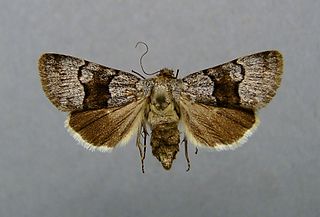
Sympistis is a genus of moths of the family Noctuidae. The genus was erected by Jacob Hübner in 1823.
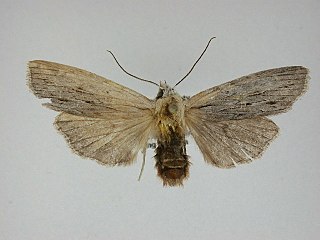
Lithophane lemmeri, Lemmer's noctuid moth or Lemmer's pinion, is a moth of the family Noctuidae. It is found in the eastern parts of the United States and adjacent areas in Canada. It is listed as a species of special concern in the US state of Connecticut. The species was first described by William Barnes and Foster Hendrickson Benjamin in 1929.
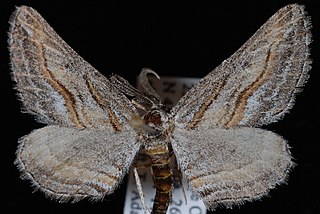
Hulstina is a genus of moths in the family Geometridae erected by Harrison Gray Dyar Jr. in 1903.

Heterocampa is a genus of moths in the family Notodontidae, the prominents.

Hypoprepia miniata, the scarlet-winged lichen moth or scarlet lichen moth, is a moth of the family Erebidae. The species was first described by William Kirby in 1837. It is found from British Columbia south through the western side of the Rocky Mountains to Arizona and Texas. It is also found throughout eastern North America.
Cisthene juanita is a moth of the family Erebidae. It was described by William Barnes and Foster Hendrickson Benjamin in 1925 and is found in the United States in southern Arizona.
Comadia is a genus of moths in the family Cossidae first described by William Barnes and James Halliday McDunnough in 1911.
Comadia intrusa is a moth in the family Cossidae first described by William Barnes and Foster Hendrickson Benjamin in 1923. It is found in North America, where it has been recorded from New Mexico, Arizona and California.
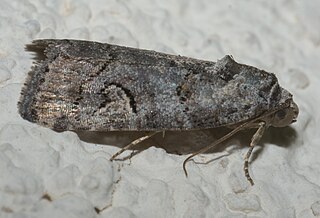
Triocnemidina is a subtribe of owlet moths in the family Noctuidae. There are about 16 genera and at least 30 described species in Triocnemidina.
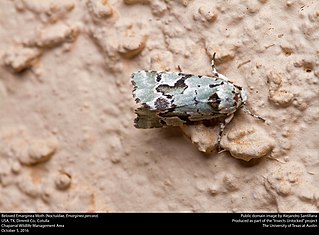
Psaphidini is a tribe of owlet moths in the family Noctuidae. There are at least 40 genera and at least 90 described species in Psaphidini.

Lacinipolia stricta, the brown arches moth, is a species of cutworm or dart moth in the family Noctuidae. It is found in North America.












